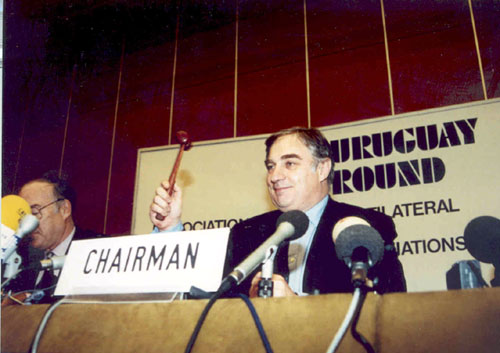The Uruguay Round has made some exceptions with regard to enforcement for developing countries. The rule of full reciprocity of preferential treatment does not apply to business dealings between developed and developing countries.
The system of relative reciprocity, applicable to developing countries, takes into account, that developing countries may not be able to make concessions on the same basis as developed countries.
The rule, however, recognises that developing countries are not all at the same level of development; some of them, particularly the Newly Industrialising Countries (NICs) have reached higher stages of growth.
ADVERTISEMENTS:
These countries are required to make larger concessions in the form of tariff reductions than those at lower levels of economic growth.
Because of the rule of relative reciprocity, only a few developing countries had made tariff concessions in earlier GATT Rounds. These concessions mainly applied to only a few products. This changed considerably in the Uruguay Round. Almost all the developing countries have agreed to make concessions (although at lower percentages than developed nations).
What is the relevance of the Uruguay Round to the decisions that industries and business enterprises make in their international trade activities?
ADVERTISEMENTS:
When considering this question, one must bear in mind that governments have negotiated improved market access to enable business enterprises to convert trade concessions into new trade opportunities.
The objective behind the strengthened rules of the Uruguay Round is to ensure that the markets remain open and that an exporter’s access is not disrupted by the sudden and arbitrary imposition of import restrictions.
Business communities are, however, not fully aware at present of the advantages which the multilateral trading system resulting from the Uruguay Round can generate for them.
The main reason for this is the immense complexity of the system, which has so far prevented these communities from taking an interest in, and getting acquainted with, its, rules.
ADVERTISEMENTS:
It is, for example, not widely known that the legal system not only confers benefits on producing industries and business enterprises, but also creates rights in their favour.
In trade of goods, almost all tariffs of developed countries and a high proportion of those in developing countries have been bound against further increases by the Uruguay Round.
This ensures that sudden increases or the imposition of other restrictions will not disrupt the improved market access resulting from the tariff reductions by importing countries. This security of access enables exporting industries to make investment and production plans under greater conditions of certainty.
Stability of access is provided through the requirement for all countries to apply at the border, the uniform set of rules negotiated in the Uruguay-and previous-Round.
Countries are obliged to ensure that their rules for determining dutiable value for customs purposes, for inspecting products to ascertain conformity to standards or for the issue of import licenses and conform to the provisions of the Round’s agreements. This helps exporters, since dissimilarities in the requirements of different markets are (slowly) eliminated.
The primary responsibility for taking advantage of the liberalisation measures now falls on enterprises. Trade clearly does not expand automatically in the wake of tariff reductions and the removal of trade barriers.
This will happen only if business enterprises adopt appropriate export development strategies to take into account the impact of the liberalisation measures on the products they export. The implementation of the Uruguay Round’s results creates both opportunities and challenges for developing countries.
The challenge will come from the increased competition in both domestic and foreign markets, which follows the removal of tariffs and other (non-tariff) barriers. The establishment of the WTO and the new (legal) system, which has emerged, should ensure that this increased competition remains fair.
It should be noted for clarity’s sake that WTO Agreements have been negotiated on an international level by governments and that it is now up to governments to implement these negotiated measures. Business communities should have full access to a country’s governmental efforts in implementing these provisions.

